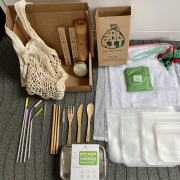
Would you like to win your way to a plastic free life? Now you can with the monthly Plastic Free Life Challenge going on each month from January to June of 2021. Each month an individual or organization can win one of our Plastic Free Life Challenge starter kits! Each kit has 42 super cool alternatives to single-use plastics, including reusable bags, sacs, utensils, straws, lunchboxes, etc.
So, how do you win? The organization or individual that conducts the most nurdle surveys in a month will win the kit. For organizations, be sure your volunteers add your organization’s name into the reporting form, and for individuals, just add your name and email into the reporting form. This fun challenge was created to encourage a little friendly competition among www.NurdlePatrol.org partners and, at the same time, conduct as many nurdle surveys as possible.
Why alternatives to single-use plastic? Scientists estimated that approximately 8 million metric tons of plastic entered the ocean in 2010. That was eleven years ago. Can you imagine how much plastic has accumulated since then? Most Americans use single-use plastic items on a daily basis without even thinking about where it goes when discarded: toothbrushes, razors, shampoo bottles, juice containers, water bottles, pens, sharpies, highlighters, and the list goes on and on. All of these items get used and then eventually are thrown away, but they never really go away because plastic, by design, doesn’t decompose. That means, plastic waste will remain on Earth indefinitely. Most plastic products float once it enters the ocean by rain, wind, streams, and storm drains. This can cause a lot of problems for marine life. Animals can become entangled in derelict fishing gear and other plastic debris or ingest small plastic pieces and/or nurdles because it gets mistaken for food.
Thanks to the Matagorda Bay Mitigation Trust for funding these kits to the dedicated volunteers of Nurdle Patrol.
About the author: Tracy Weatherall, Nurdle Patrol Assistant at the Mission-Aransas National Estuarine Research Reserve at the University of Texas Marine Science Institute.

